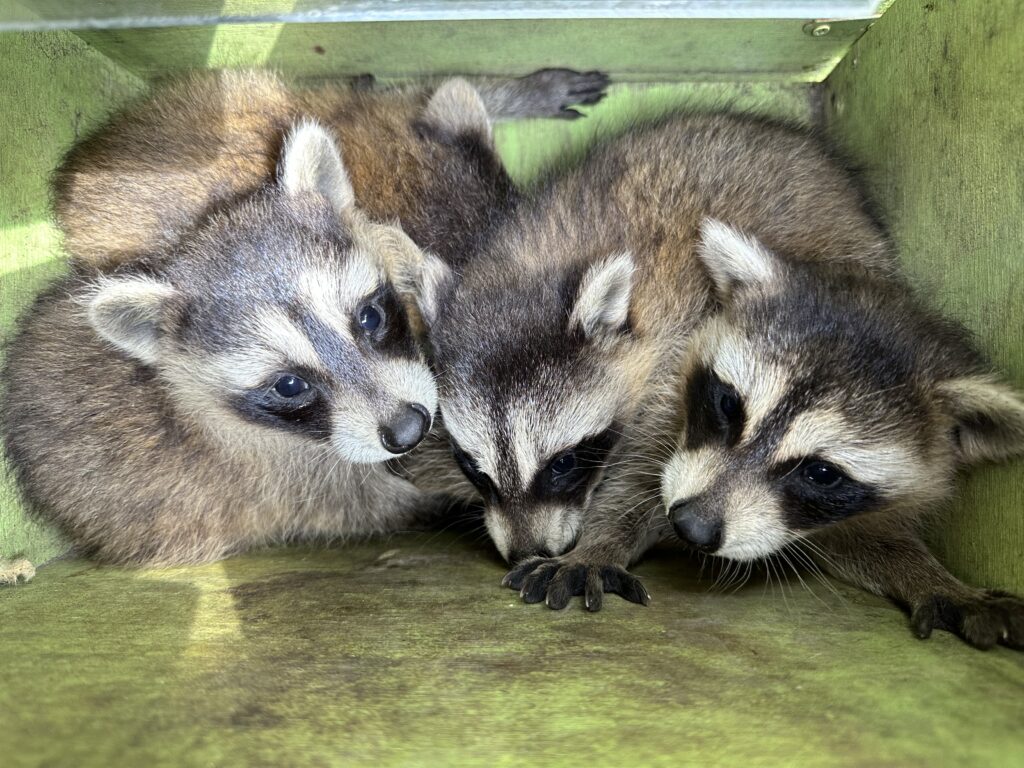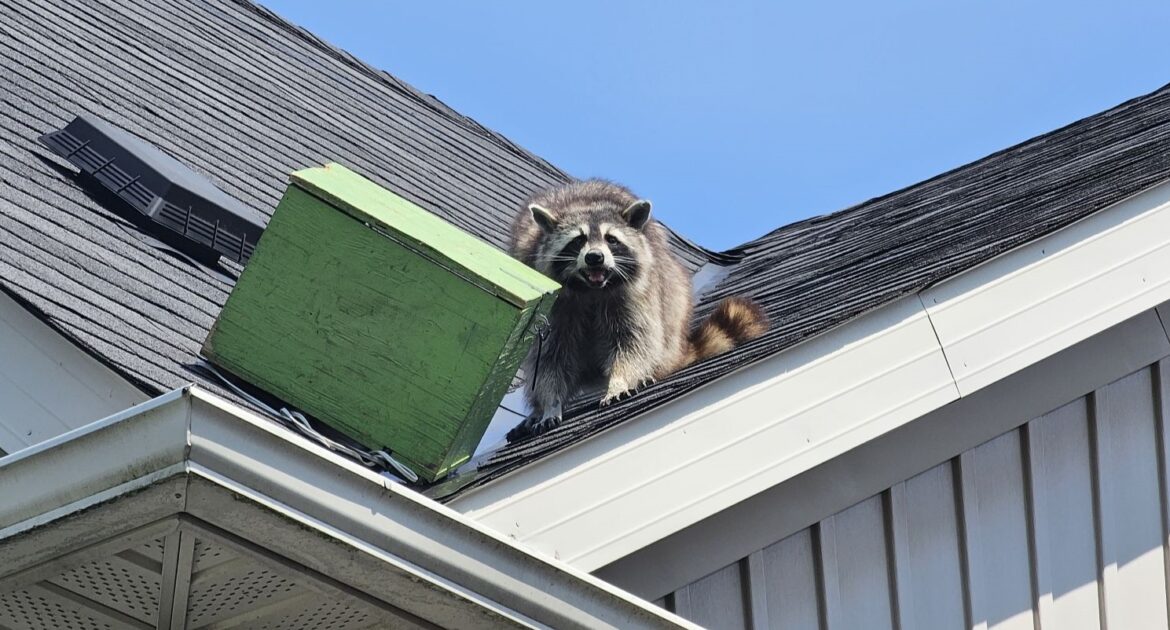Raccoons may seem cute and harmless from a distance, but their waste is anything but. Their feces can carry a variety of dangerous diseases that can harm humans and pets alike. But what does raccoon poop look like?
Typically, it is tubular, dark in color, and around the size of a medium dog’s feces. The dangers of raccoon waste are not to be taken lightly. Raccoons are known carriers of several diseases, including rabies, leptospirosis, and salmonella. If you suspect that raccoon waste is present on your property, it’s essential to contact a local wildlife removal service like Skedaddle in Minneapolis immediately.
Attempting to clean up the waste independently can be hazardous, as it puts you at risk of contracting these diseases. In this article, our Skedaddle experts will explore the dangers of raccoon waste and why it’s crucial to seek professional cleanup services.
Are Raccoons Dangerous?
If you have ever discovered the unmistakable signs of an infestation in your attic, garage, or crawl spaces – telltale signs like rummaging noises in the night, scattered trash, and above all else, their unique, disquieting droppings – you may already be aware that these seemingly harmless animals pose a significant risk to human health. Among the biggest dangers associated with their presence is their waste.
Raccoon waste, particularly their droppings, is not just unsightly and unpleasant, it also carries a number of harmful pathogens that are dangerous to humans and pets. Known to carry a wide range of potentially lethal diseases such as rabies, leptospirosis, and roundworm, just to name a few, it’s clear as day that the harm these seemingly innocent critters can do extends much beyond damaged trash and chaotic lawns.
That being said, it’s always wise to take immediate action the moment you spot the signs of their presence in your property. The very first step you should take, even before devising deterrent measures, is eliminating the dangers tied to raccoon waste.
Potential Health Hazards Posed by Raccoon Waste
The primary concern with raccoon waste stems from the diseases it can potentially carry. One of the most severe is baylisascariasis, a brain and body-attacking parasite that is transmitted through feces. While it is typically rare in humans, infection can lead to serious illness, and in the worst cases, death. Roundworms, another parasite found in droppings, can also pose a threat to human health.
Raccoon urine also poses dangers of its own, being a potential carrier of leptospirosis, a bacterial infection that can cause a wide range of symptoms, from mild flu-like illness to severe, life-threatening conditions. Another danger of coming into contact with urine is the potential exposure to rabies.
However, keep in mind that these hazards don’t just come from direct contact with the waste itself. Merely inhaling the spores that are released could result in transmission of these diseases. This condition underscores the need for safe and professional removal practices when dealing with infestations and waste.
Preventive Measures Against Raccoon Infestation
Understanding the risks associated with raccoon waste, you undoubtedly would want to avoid a raccoon infestation in the first place. As a team of experts at Skedaddle, we’re here to guide you through this. The first step is to make your home and environment less attractive to these wildlife intruders. Here’s how:
Secure Your Trash
Raccoons are notoriously known for their scavenging habits. They are enticed by the smell of leftover food in your garbage bin. Make sure to keep your trash cans tightly sealed to discourage these critters from treating your property like a buffet.
Trim Overhanging Tree Branches
These arboreal animals often use tree branches as an access route to your loft or attic. By keeping the branches well-trimmed, you minimize the risk of an infestation.

Maintain Your Yard
Keep your property neat and tidy. An overgrown yard provides ample hiding and nesting spots for raccoons. Regular maintenance such as mowing the lawn, eliminating piles of wood or debris, and sealing off potential entrances will deter raccoons from taking up residence on your property.
Install a Chimney Cap
Many homeowners overlook the chimney as a potential entry point for raccoons. By sealing your chimney with a cap, you create a physical barrier preventing raccoons from nesting inside.
These are effective ways to make your home less appealing to raccoons, helping to keep their waste – and the associated diseases – out of your property. Proactively managing your environment can prevent an infestation before it begins. If, however, you do suspect you have a raccoon problem, it is crucial to contact professionals like Skedaddle immediately. Trying to handle raccoon removal yourself can put you at risk of exposure to diseases and, importantly, can be illegal without the proper wildlife permits.
Skedaddle’s Post-Cleanup Procedures: Ensuring a Raccoon Waste-Free Environment
At Skedaddle, we understand the dangers associated with raccoon waste and are committed to eliminating the associated risks for homeowners. Our dedicated team of wildlife removal experts offers a comprehensive cleanup procedure to ensure a raccoon waste-free environment.
Skedaddle’s Raccoon Infestation Cleanup Procedure
Our thorough procedure begins with a detailed assessment of infested areas. The team meticulously locates and removes all traces of waste, and damaged insulation, ensuring nothing is left to harm your health or property.
Next, we treat the contaminated area with a specially-formulated enzyme-based cleaning agent designed to neutralize harmful bacteria and parasites. This agent also eliminates the inviting scent left by animals, deterring future infestations.
Finally, the area is professionally deodorized to remove any lingering odors. Our comprehensive service concludes with a detailed report, outlining the work carried out and offering additional recommendations for preventing further raccoon incursions.
Why Choose Skedaddle for Wildlife Removal?
The daunting task of removing raccoon waste should be entrusted to capable and trained professionals. By selecting Skedaddle, you benefit from our years of experience in dealing with wildlife removal. Our credentials speak volumes about our commitment to this field.
Firstly, Skedaddle invests in intensive training, ensuring our team is updated with the latest strategies and techniques to address all forms of wildlife infestation. We take pride in our comprehensive understanding of raccoon behavior, which allows us to effectively remove them and their waste without causing harm to the animals or the environment.
Secondly, Skedaddle implements a humane and effective system for raccoon removal. Our process emphasizes the deployment of non-lethal, environmentally-friendly solutions that leave minimal impact on wildlife. Our primary goal is to return these raccoons to their natural habitat with as little stress as possible, while simultaneously ensuring the safety and cleanliness of your property.
Lastly, Skedaddle offers post-cleanup procedures that are second to none. Upon completion of raccoon removal and cleanup, our team conducts a thorough assessment to identify and seal potential entry points, preventing future intrusions. Additionally, we provide guidance on measures you can undertake to keep your home raccoon-free. This comprehensive solution is why property owners across the nation trust Skedaddle.
When it comes to dealing with raccoon waste and other wildlife issues, it is critical to choose a partner that puts your safety, as well as the animals’, at the forefront. With Skedaddle, you are in safe and capable hands.
Ready to secure the safety of your home or business against raccoon threats? Don’t wait for problems to escalate. Contact Skedaddle Wildlife Control in Minneapolis today! Our team of experts is committed to providing humane, effective, and lasting solutions to your raccoon challenges. Act now to protect your property and maintain a clean, raccoon waste-free environment.



